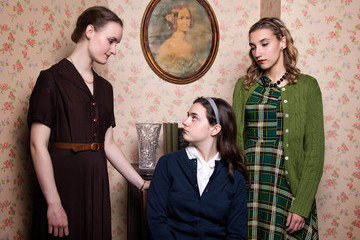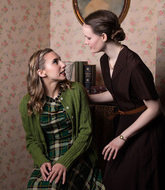
02/12/2019
Lillian Hellman’s play “The Children’s Hour” was controversial upon its debut on Broadway in 1934.
It tells the story of two female teachers whose lives are forever changed when a pupil falsely accuses them of engaging in a romantic relationship.
SUNY Cortland presents “The Children’s Hour” March 1-3 because its messages still resonate 85 years later. The play examines insidious homophobia and touches on themes of family, loyalty and how a community deals with rumors and innuendo.
“I think what’s so beautiful about the timelessness of this play is that it shows us how far we’ve come,” said Director Mark Reynolds. “In our current situation, I think it’s refreshing.”

The play’s central characters, Martha Dobie and Karen Wright, are played by Nicole Furka, a junior from Massapequa, N.Y. and Bailey Hovermale, a junior from Hagerstown, Md., respectively. The characters have opened the Wright-Dobie School for Girls, a boarding school in the New England countryside.
The accusation from the student is particularly hard for Martha, who is single and faces certain social challenges of the era that her engaged friend Karen does not. Furka has worked to empathize Martha’s situation in her portrayal of the character.
“You see how it takes a toll on her personally and how it ruins the friendship and how it ruins her life,” Furka said. “It was such a taboo thing to be gay or to have two women living together. For that lie to come out during that time period, it was unnatural and she had to have that weight on her shoulders.”
Reynolds has spent time with actors talking about the history of “The Children’s Hour” and how it was received upon its release. Today’s audiences approach the subject matter differently but the work remains just as relevant in 2019.
“It’s a very compelling story that Hellman wrote. It’s brilliant,” Hovermale said. “Mark has explained things and made things clear that I didn’t even realize before. It’s really terrifying in the portrayal of the child, who knows what she’s doing, but the women don’t see it coming and it’s heartbreaking. It’s also human. You see characters who are relevant to today.”
“The Children’s Hour” is based on a true story that happened at a school in Edinburgh, Scotland in 1810. It hit the stage in New York City less than one year after the ratification of the 21st Amendment, which repealed prohibition. Anti-gay rules were written into legislation for the newly-created New York State Liquor Authority, including a ban on featuring gay characters in plays or musicals. Although the show went on in New York, it was banned in cities such as Boston, Chicago and London.
A true-to-script film adaptation of “The Children’s Hour” starring Audrey Hepburn and Shirley MacLaine was released in 1961. Liz Davis, a junior from Manassas, Va., who plays Amelia Tilford, the grandmother of the child who accuses her teachers, recalled seeing a documentary, “The Celluloid Closet,” in which MacLaine shared that she and Hepburn filmed their scenes without ever talking about the context of the plot.
Davis hopes audiences leave the theatre doing the exact opposite.
“The discourse is integral for us today,” she said. “It’s such a hard thing for us today to understand why someone would feel that way about someone who just wants to love someone else. It’s about showing that victimization and the exposure of it. People need to be exposed to it time and time again.”
“The Children’s Hour” will be performed in an intimately configured Dowd Fine Arts Center Theatre at 7:30 p.m. on Friday, March 1 and Saturday, March 2 and at 2 p.m. on Sunday, March 3. Tickets, which are limited, are $19 for adults, $16 for senior citizens and SUNY Cortland faculty and staff, $14 for SUNY Cortland alumni and $10 for current students. They are available at Cortland.edu/boxoffice.